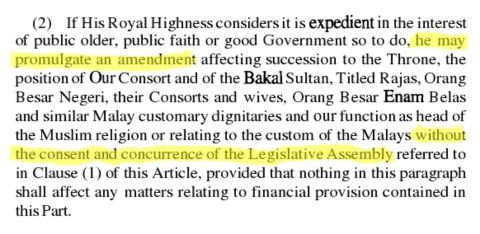
Assembly has no power over some royal matters
The Perak Sultan’s legal powers have come under scrutiny again after the state constitution was amended through a simple resolution of the house. It was followed by somewhat half-baked arguments by the Perak opposition that the amendment was not properly done, lacking the usual vote and approval by a two-third majority.
The protests by Nizar Jamaluddin and his right-hand man Ngeh Koo Ham, both of Pakatan Rakyat, may be off the mark — the Perak constitution reserves certain powers to the Sultan on royal matters.
He can even promulgate an amendment on his own without the courtesy of seeking “advice and concurrence” from the legislature.
 Ngeh, a lawyer, was quoted by Malaysiakini as arguing that the Perak constitution requires amendments to be made by enactment, approved with a two-third majority vote.
Ngeh, a lawyer, was quoted by Malaysiakini as arguing that the Perak constitution requires amendments to be made by enactment, approved with a two-third majority vote.
Nizar and Ngeh headed the state administration elected into office in the 2008 general election which was ousted last year under questionable circumstances, by the Sultan exercising a disputed power to sack the menteri besar following defections from Pakatan Rakyat.
Ngeh’s argument seems more of a political gambit: he and Nizar would love to embarrass Zambry Abdul Kadir’s administration by forcing a vote; with a majority of only three votes and unlikely to muster support from assemblymen in Pakatan Rakyat, the Bill would fail to get a two-third majority.
In that case, Zambry’s government could fall.
Tit for tat.
But Ngeh and Nizar’s arguments may not hold water this time.
The Perak Constitution states quite clearly that the Sultan reserves to himself certain powers to amend parts of the constitution relating to royal matters. And it also states, quite unambiguously, that the State Assembly shall not amend by enactment certain sections relating to royal matters.
The Sultan does not even need the state assembly.

The full text of the Perak Constitution is available here
http://docs.google.com/viewer?url=http://www.digitalibrary.my/dmdocuments/malaysiakini/273_perak.pdf
PART I
3. Amendment of the Perak Constitution.
(2) The provisions affecting succession to the throne, the position of Our Consort and of the Bakal Sultan, Titled Rajas, Orang Besar
Negeri, their Consorts and wives, Orang Besar Enam Belas and similar Malay customary dignitaries and Our function as head of the
Muslim religion or relating to the custom of the Malays and Articles 57 to 72 of the Second Part may not be amended by the State Legislature.
Articles 57-72 are about the Dewan Negara (the Council of State, or privy council, which advises the Sultan on royal matters).
Clause 3(3) says that provisions not affecting royal matters may be amended by Enactment but not by any other means. It seems an enactment is necessary for those matters not affecting the royal household.
Ngeh, relying on Clause 3(3), wants to force Zambry to face a vote on an enactment to amend the constitution, a vote that Zambry would fail to win.
But Nizar and Ngeh’s argument does not take into account the Sultan’s reserve powers (Article 2, Part II): the Sultan reserves to himself “power to declare and ordain” parts of the state constitution regarding the Sultan’s functions as head of religion and on Malay customs.
Article 3 (Part II) allows the Sultan to amend provisions relating to royal matters, on the advice of the Dewan Negara and “with the advice and concurrence of the Legislative Assembly”.
Only the “advice and concurrence” of the legislature is required. A simple resolution of the house would suffice, it would seem. Any other article must be amended by enactment approved by a two-third majority vote as usual.
And of course when all else fails, there is Article 3(2) which allows the Sultan to promulgate an amendment without the legislature.
While it is understandable that the ousted Pakatan Rakyat administration would be peeved by another exercise of royal prerogative, and by the current state administration going along with it, their objection this time seems half-baked.
But if any little legal contretemps is to ensue, it might be over what exactly was in the amendment.
But what did they amend?
According to Malaysiakini,
Following the 147th meeting of the Perak Royal House headed by Sultan Raja Azlan Shah on Aug 12, the ruler had directed for Article 58 (1)(a) of the Second Part of the Perak Constitution to be amended.
The amendment was to accommodate four more Raja Yang Bergelar with the titles Raja Kechil Besar, Raja Kechil Sulong, Raja Kechil Tengah and Raja Kechil Bongsu into the Royal House.
But the text of the Perak constitution at Digital Library (see link above) shows the four Titled Raja listed in Article 37(1) as Raja Kecil Besar, Raja Kecil Sulong, Raja Kecil Tengah, and Raja Kecil Bongsu. The four titles are already in place. The Raja Kecil Besar is new, and the title of Raja Kecil Muda abolished.
Article 38(1)(a) of the Digital Library text lists four Orang Besar Ampat: Orang Kaya Bendahara Sri Maharaja, Orang Kaya Besar Maharaja di-Raja, Orang Kaya Temenggong Paduka Raja and Orang Kaya Menteri Paduka Tuan.
And Article 58(1)(a) is about the members of the Dewan Negera (the Council of State).
Something needs to be cleared up.
courtesy of uppercaise



No comments:
Post a Comment
Note: Only a member of this blog may post a comment.